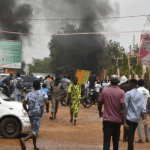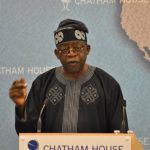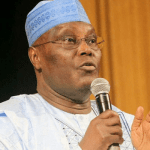In recent times, the West African region has been facing mounting challenges to its democratic stability. A significant incident that raised concerns about the region’s democratic progress was the Niger coup in [month, year]. This violent takeover of power in a neighboring country has sent shockwaves through the region, especially in Nigeria, which shares borders and close political ties with Niger.
In this article, Wasiu Salami, TVC News Senior Executive, Digital Content and Social Media examines the Niger coup and its implications on Nigeria’s democracy, highlighting the potential threats it poses to the nation’s political landscape.

The Niger Coup: A Brief Overview
On 26 July 2023, the Presidential Guard in Niger launched a coup and detained President Mohamed Bazoum and his family. Senior officers from various branches of the defense and security forces (FDS) formed a junta, named the National Council for the Safeguarding of the Homeland (CNSP), and announced the seizure of power on a televised broadcast. Public response varied, with initial demonstrations in support of Bazoum being dispersed by mutinous soldiers, followed by subsequent demonstrations in support of the CNSP. By 27 July, the Nigerien Armed Forces joined the CNSP, citing their intent to avoid lethal confrontation and to safeguard the president and his family.
The coup has largely been condemned internationally, including by key stakeholders like the United States, France, the European Union, and ECOWAS. During a summit in Nigeria’s capital Abuja, ECOWAS considered military intervention, and threatened sanctions to pressure the junta to reinstate Bazoum by giving a one-week ultimatum. The West African Economic and Monetary Union (UEMOA) imposed immediate sanctions and froze Nigerien state assets. Burkina Faso, Guinea, and Mali have declared their support for the Nigerien junta and expressed their refusal to apply any sanctions imposed on Niger. Burkina Faso and Mali further warned in a joint statement that any military intervention in Niger was a declaration of war against the two countries. The reactions in support of Niger from the junta-led states has set the stage for a deeper divide and potential break-up of the West African bloc.
The coup’s aftermath brings a high potential for domestic unrest and regional conflict, a surge in militant activities, democratic backsliding and restriction of civil liberties, and severe socio-economic consequences due to sanctions. Furthermore, the military junta has not consolidated its power grab and faces strong opposition by many international stakeholders. Bazoum not only enjoys support from the international community but also from a large segment of the population across Niger, with signs of supporters counter-mobilizing for mass demonstrations against the junta.
Threats to Nigeria’s Democracy?
As Nigeria’s closest neighbor, the coup in Niger poses several direct and indirect threats to Nigeria’s democracy.
- Contagion Effect: The coup in Niger could potentially embolden anti-democratic elements within Nigeria. Political agitators or disgruntled factions may draw inspiration from the success of the coup in a neighboring country and attempt similar actions within Nigeria, leading to political instability and insecurity.
- Cross-border Instability: The instability in Niger might spill over into Nigeria, leading to an influx of refugees, arms smuggling, and increased criminal activities along the shared borders. This could exacerbate existing security challenges faced by Nigeria, such as the Boko Haram insurgency and banditry.
- Regional Diplomatic Tensions: The fallout from the coup in Niger may strain diplomatic relations between Nigeria and other countries in the region. Nigeria, being a major player in West Africa, would have to navigate carefully to address the political crisis in its neighbor while safeguarding its interests and regional influence.
- Erosion of Trust in Democratic Institutions: Witnessing a neighboring country’s democratic system being subverted can erode public trust in Nigeria’s democratic institutions. Citizens may become disillusioned with the electoral process, leading to increased apathy and a decline in civic participation.
- Economic Consequences: Political instability in the region may discourage foreign investment and hamper economic growth in Nigeria. Investors may perceive the region as unpredictable and risky, leading to capital flight and a slowdown in economic development.

Response and Mitigation
To counter the threats posed by the Niger coup to Nigeria’s democracy, the government and relevant stakeholders must take proactive measures:
- Strengthen Democratic Institutions: Nigeria should invest in building robust democratic institutions, including an independent judiciary, a free press, and an impartial electoral commission. These institutions are crucial for upholding the rule of law and ensuring free and fair elections.
- Promote Regional Cooperation: Nigeria should collaborate with neighboring countries, regional bodies like the Economic Community of West African States (ECOWAS), and international partners to address the political crisis in Niger collectively. A coordinated effort is necessary to prevent further destabilization in the region.
- Engage in Preventive Diplomacy: Nigeria can play a pivotal role in mediating conflicts and promoting peaceful resolutions to political crises in the region. By actively engaging in preventive diplomacy, Nigeria can help avoid the recurrence of coups and foster stability.
- Encourage Civil Society Engagement: The Nigerian government should actively encourage civil society organizations and citizen groups to participate in the democratic process. A vibrant civil society can act as a watchdog, holding the government accountable and promoting transparency.
Conclusion
The Niger coup serves as a wake-up call for Nigeria and the entire West African region. The incident underscores the fragility of democratic systems and the potential threats they face from anti-democratic forces. As a regional powerhouse, Nigeria must take the lead in safeguarding its democracy and supporting the stability of its neighbors. By investing in strong democratic institutions, promoting regional cooperation, and engaging in preventive diplomacy, Nigeria can protect its democracy and contribute to the broader effort of upholding democratic norms in West Africa.














